Children to Bloomington’s city forester for the last 37 years: “Thank you for speaking for the trees!”
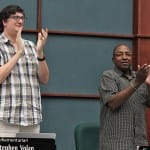
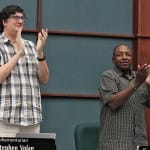
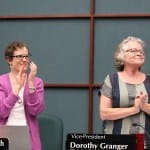
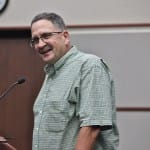
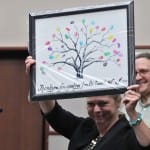
A couple of weeks ago at their regular meeting, members of the city’s board of park commissioners recognized Lee Huss for his 37 years of service to the city of Bloomington as urban forester. Two days before his final day of work at the city, the city council reprised the same sentiments.
On Wednesday night, council president Dave Rollo read aloud an encomium for Huss that quoted the former mayor of Bloomington who hired him, Tomilea Allison: “Few civil servants have left such a visible imprint on our city, and for that, Lee has our heartfelt gratitude.” Huss’s imprint includes increasing the number of street streets from under 8,000 to over 19,000 in the latest tree inventory.
Huss’s work in the last 11 years has included managing the city’s ash trees, which were at risk of total loss due to the emerald ash borer. He helped Bloomington achieve Tree City USA status—making it the first community in Indiana to reach that goal.
Huss took the podium to deliver a couple of comments, leading off with, “Thirty-seven years is not long in the life of a tree.” Huss thanked his co-workers over the years and Mayor Allison, who gave him a job at the city. He was grateful for the chance to help give Bloomington “the urban forest that this community deserves,” Hess said. He also recognized the community’s enthusiasm for trees, saying, “It’s been a tree loving community long before Lee Huss showed up. … It’s going to always be a tree loving community.”
Susan Coleman spoke on behalf of her father, tree commissioner Tom Coleman, thanking Huss for his service. Susan Coleman also presented Huss with a poster-sized card that read “Thank you for speaking for the trees!” It was made by the first- and second-graders at the Project School, who had participated in an after-school activity led by teacher Cindy Simpson.
They’d used species identification guides to identify trees in the Waldron Hill Buskirk Park, Coleman said. She presented Huss with a copy of “The Lorax” by Dr. Seuss, signed by the children. (The book is the source of the message on the children’s card: “I am the Lorax. I speak for the trees. I speak for the trees for the trees have no tongues.”
The Beacon’s hard-hitting question for Hess was: If you could be a tree, what kind of tree would you be? He responded with good humor. An oak, he said, because they are long-lived, and provide the most ecological services to other organisms. Asked to be more specific, he named the white oak, “Just because, I like bourbon, too—it’s used for whisky barrels.”




Comments ()